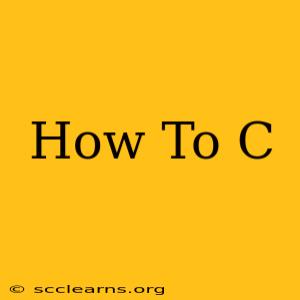This comprehensive guide will walk you through the fundamentals of the C programming language, from setting up your environment to building complex programs. Whether you're a complete novice or have some programming experience, this tutorial will equip you with the skills you need to confidently write C code.
Setting Up Your C Programming Environment
Before you can start writing C programs, you need to set up your development environment. This involves choosing a suitable compiler and text editor (or Integrated Development Environment - IDE). Popular compilers include:
- GCC (GNU Compiler Collection): A powerful, free, and open-source compiler available on most operating systems.
- Clang: Another excellent, open-source compiler known for its helpful error messages.
- Visual Studio: A comprehensive IDE from Microsoft, particularly well-suited for Windows development.
Many online tutorials and resources are available to guide you through the specific installation process for your chosen compiler and environment. Remember to verify your installation by compiling a simple "Hello, world!" program. This ensures everything is working correctly before you progress.
Understanding C Fundamentals: Data Types and Variables
C is a statically-typed language, meaning you must declare the data type of a variable before using it. Common data types include:
int: Stores integers (whole numbers).float: Stores single-precision floating-point numbers (numbers with decimal points).double: Stores double-precision floating-point numbers (higher precision thanfloat).char: Stores single characters.void: Represents the absence of a type.
Example:
#include <stdio.h>
int main() {
int age = 30;
float price = 99.99;
char initial = 'J';
printf("Age: %d\n", age);
printf("Price: %f\n", price);
printf("Initial: %c\n", initial);
return 0;
}
This code snippet declares three variables (age, price, and initial) with different data types and then prints their values to the console. Note the use of printf for output, and the format specifiers (%d, %f, %c) that correspond to the data types.
Control Flow: Making Decisions with if, else, and switch
Control flow statements allow you to dictate the order in which your program executes instructions. Key control flow elements in C include:
ifstatement: Executes a block of code only if a specified condition is true.elsestatement: Executes a block of code if theifcondition is false.else ifstatement: Allows for multiple conditions to be checked sequentially.switchstatement: Provides a more efficient way to handle multiple conditions based on the value of an expression.
Example (if-else):
#include <stdio.h>
int main() {
int number = 10;
if (number > 0) {
printf("Number is positive.\n");
} else {
printf("Number is not positive.\n");
}
return 0;
}
Loops: Repeating Actions
Loops allow you to repeat a block of code multiple times. C provides three main loop types:
forloop: Ideal for iterating a specific number of times.whileloop: Repeats a block of code as long as a condition is true.do-whileloop: Similar towhile, but guarantees at least one execution of the block.
Example (for loop):
#include <stdio.h>
int main() {
for (int i = 0; i < 5; i++) {
printf("Iteration: %d\n", i);
}
return 0;
}
This loop iterates five times, printing the current iteration number in each iteration.
Functions: Modularizing Your Code
Functions help organize your code into reusable blocks, improving readability and maintainability. A function takes input (arguments), performs operations, and may return a value.
Example:
#include <stdio.h>
int add(int a, int b) {
return a + b;
}
int main() {
int sum = add(5, 3);
printf("Sum: %d\n", sum);
return 0;
}
This defines a function add that takes two integers as input and returns their sum. The main function then calls add and prints the result.
Arrays and Pointers: Working with Data Collections
Arrays allow you to store multiple values of the same data type. Pointers hold memory addresses, enabling powerful memory manipulation and efficient data access. Understanding pointers is crucial for mastering C. More advanced topics include structures, unions, and file handling, which are essential for building more robust applications.
This guide provides a foundational understanding of C programming. Further exploration into the language's features and libraries will significantly enhance your programming capabilities. Remember to practice consistently; the best way to learn C is by writing code!

